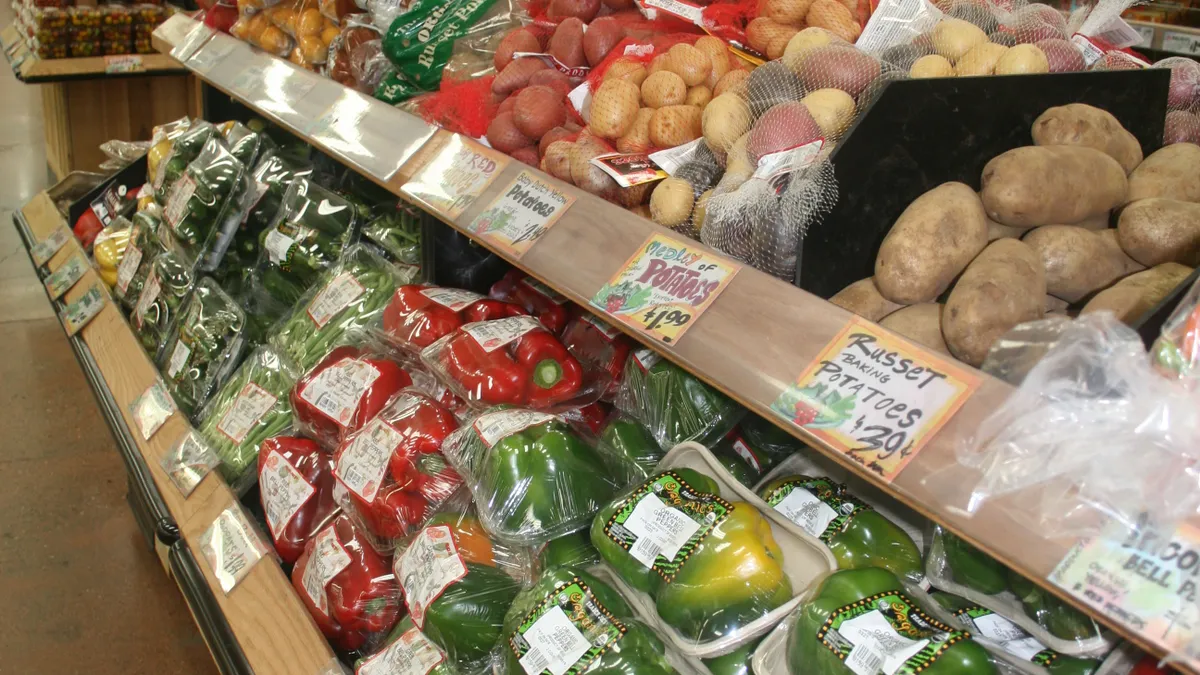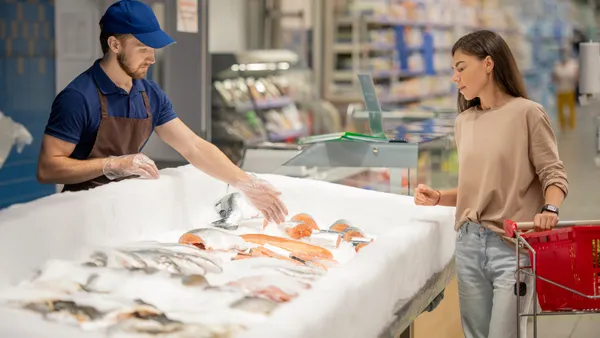Dive Brief:
-
More than 80,000 people have signed a Change.org petition urging Trader Joe’s to reduce its reliance on plastic packaging. A Portland, Oregon resident started the petition two months ago, calling out the grocer for relying on bagged produce and other packaging deemed superfluous.
-
Trader Joe’s says it sells more than half of its produce in bulk, but discerning customers have veered away from the chain to avoid excess plastic, SFGate reported. Though many companies note plastic packaging is recyclable, an increasing amount of plastics are getting diverted to landfills, the site noted.
-
This isn’t the first time customers have pressured the beloved chain to shift gears. In 2015, more than 100,000 people signed a petition requesting it sell only cage-free eggs, according to Change.org. Earlier this year, Trader Joe’s agreed to phase out pork products from factories that use gestation crates after pressure from an animal rights group, according to WTTW Chicago.
Dive Insight:
As a feel-good brand loved for its low-cost natural products, Trader Joe’s might be under a tougher microscope than other grocers. Customers run the gamut from health-conscious to bargain-driven.
Many are fiercely loyal and expect more from their TJ’s, as it’s affectionately known. In theory, the chain has delivered on value and quality, but it puts that loyalty at risk if shoppers believe it isn't also delivering on animal and environmental welfare.
Trader Joe’s has long been known for its bagged apples and avocados, as well as its uniquely flavored snacks and affordable selection of granola and nuts. But all of those products come sealed in branded plastic bags or non-recyclable netting. The chain has been selling one-pound bags of California-grown pistachios and almonds since 1989. Notably, TJ’s lacks one major incentive to skip the plastic: bulk sections, now a staple of most Whole Foods and a core focus at waste-focused stores that have cropped up in Europe and the U.S.
In the U.K., plastic waste has surpassed price as consumers’ top concern. In North America, Danone, Nestlé and Mars have joined forces in a sustainability pact, and McDonald’s has committed to recycling 100% of packaging in its restaurants by 2025.
Consumers are paying more and more attention to sustainability and transparency, while consumer groups lobby food companies to change their tune. Nearly a quarter of landfill waste stems from containers and packaging, much of it from food packaging according to the Environmental Protection Agency. Turning to recyclable or compostable materials can alleviate some of that waste — though these options are typically more expensive.
Kroger made waves when it announced a plan to eliminate single-use plastic bags by 2025. TJ’s, meanwhile, hasn’t escaped criticism for what has been deemed a theoretical rather than practical commitment to sustainability or fair working conditions, The Atlantic reported in 2012. The chain has stayed noticeably mum on the manufacturers of its private label products, but it seems to listen when their loyal customers start chattering.
After Greenpeace chastised TJ’s for selling endangered fish species that year, the company pulled affected products from its shelves and re-committed to sustainable sourcing. Now it’s one of the top ten retailers for sustainable seafood options, according to Greenpeace, behind Whole Foods and Wegmans but ahead of chains like Kroger and Albertsons
With history as precedent, there's a good chance Trader Joe's will respond should this petition surpass 100,000 signatures, as its creator hopes. What that means in theory, though, remains debatable. The chain has, to its credit, expanded the selection of loose produce beyond bananas — one of the most popular products alongside wrapped-in-plastic favorites like chocolate peanut butter cups, peanut butter pretzels and Mandarin orange chicken.












